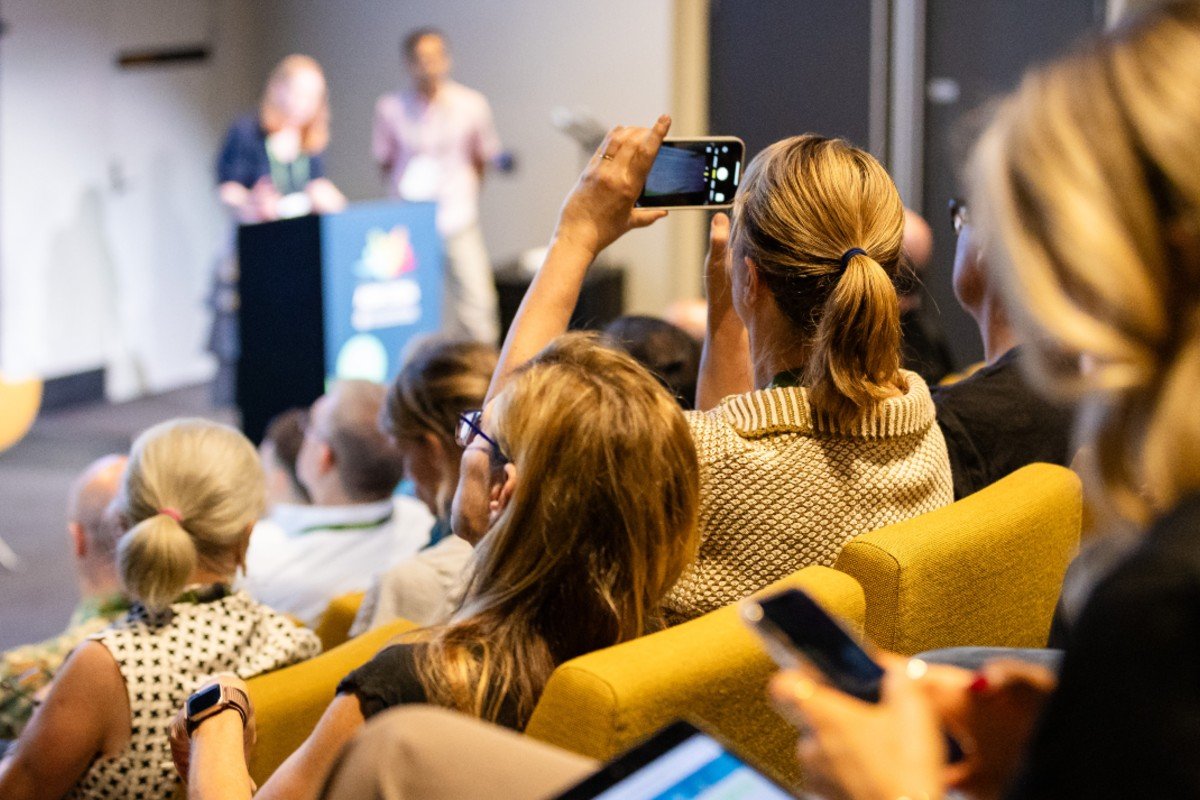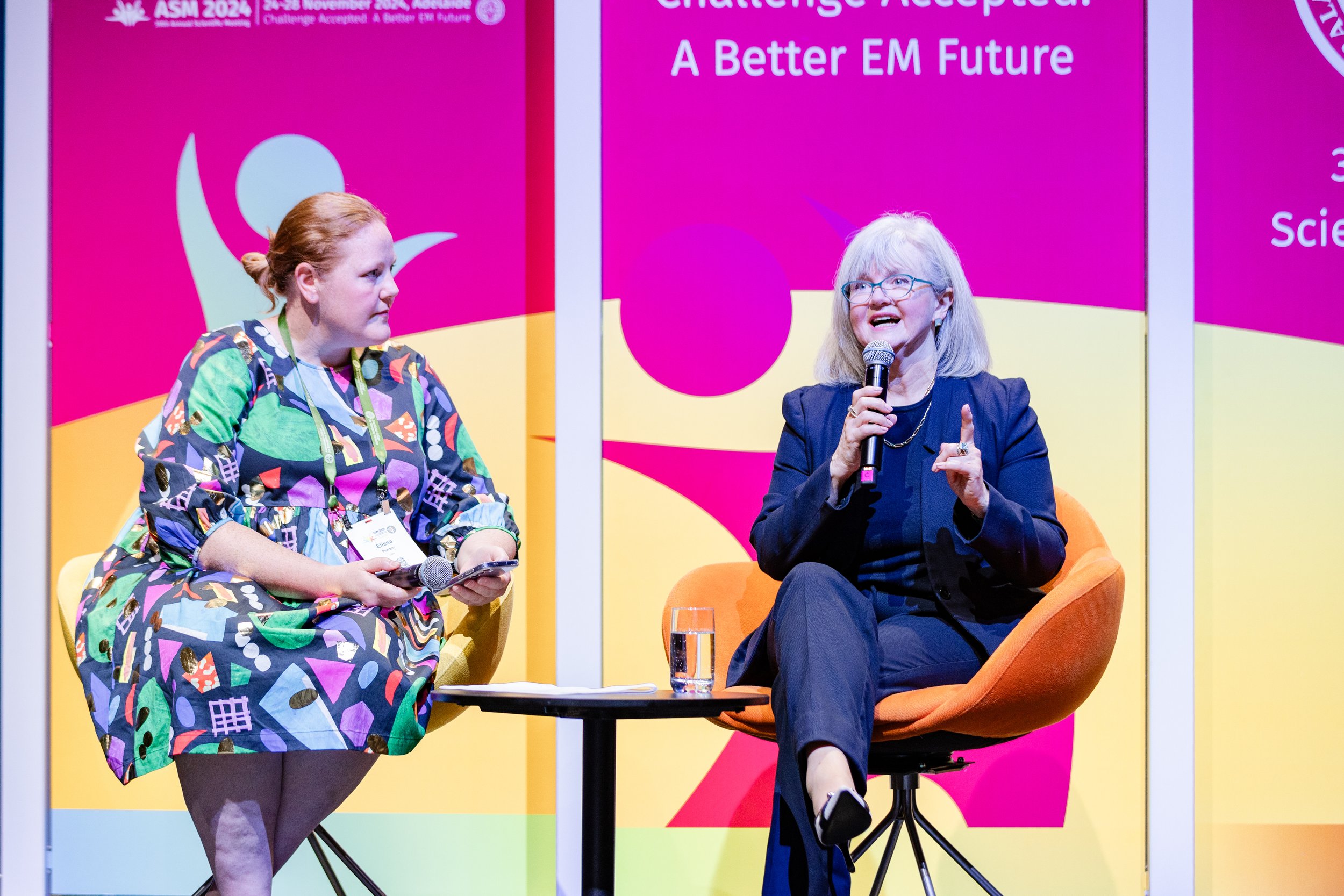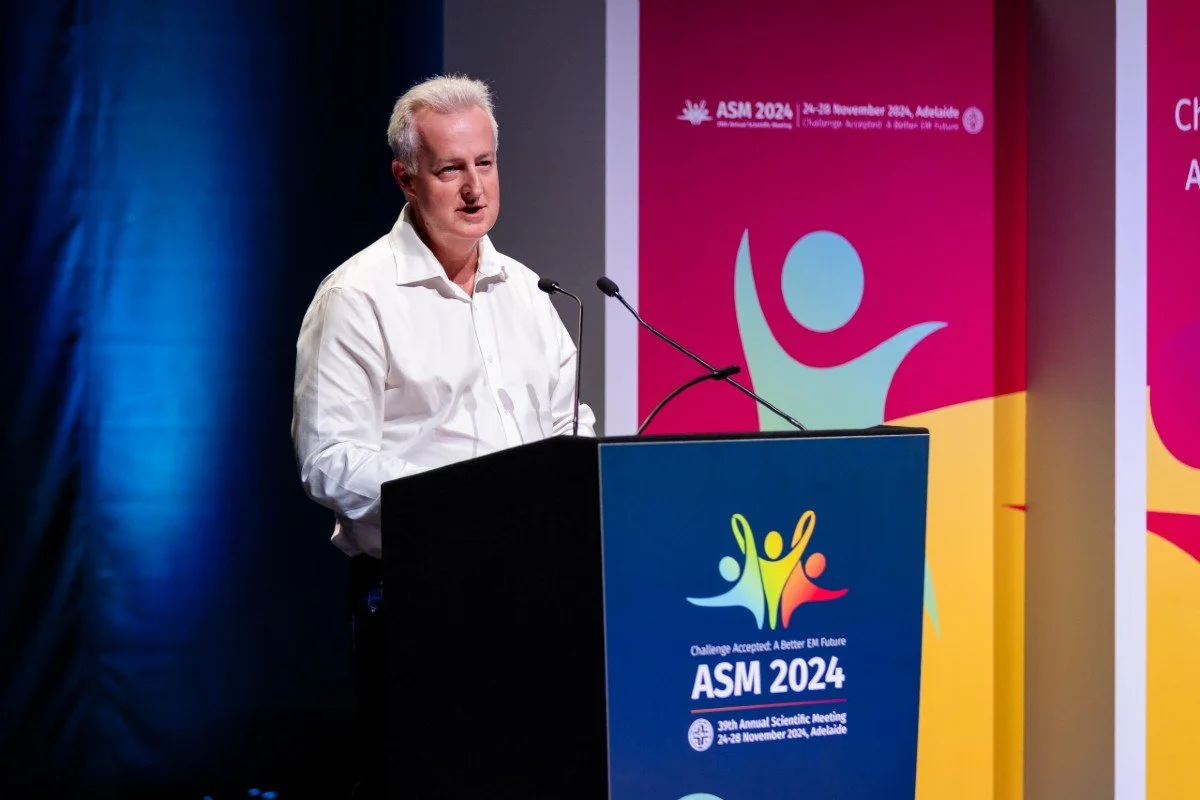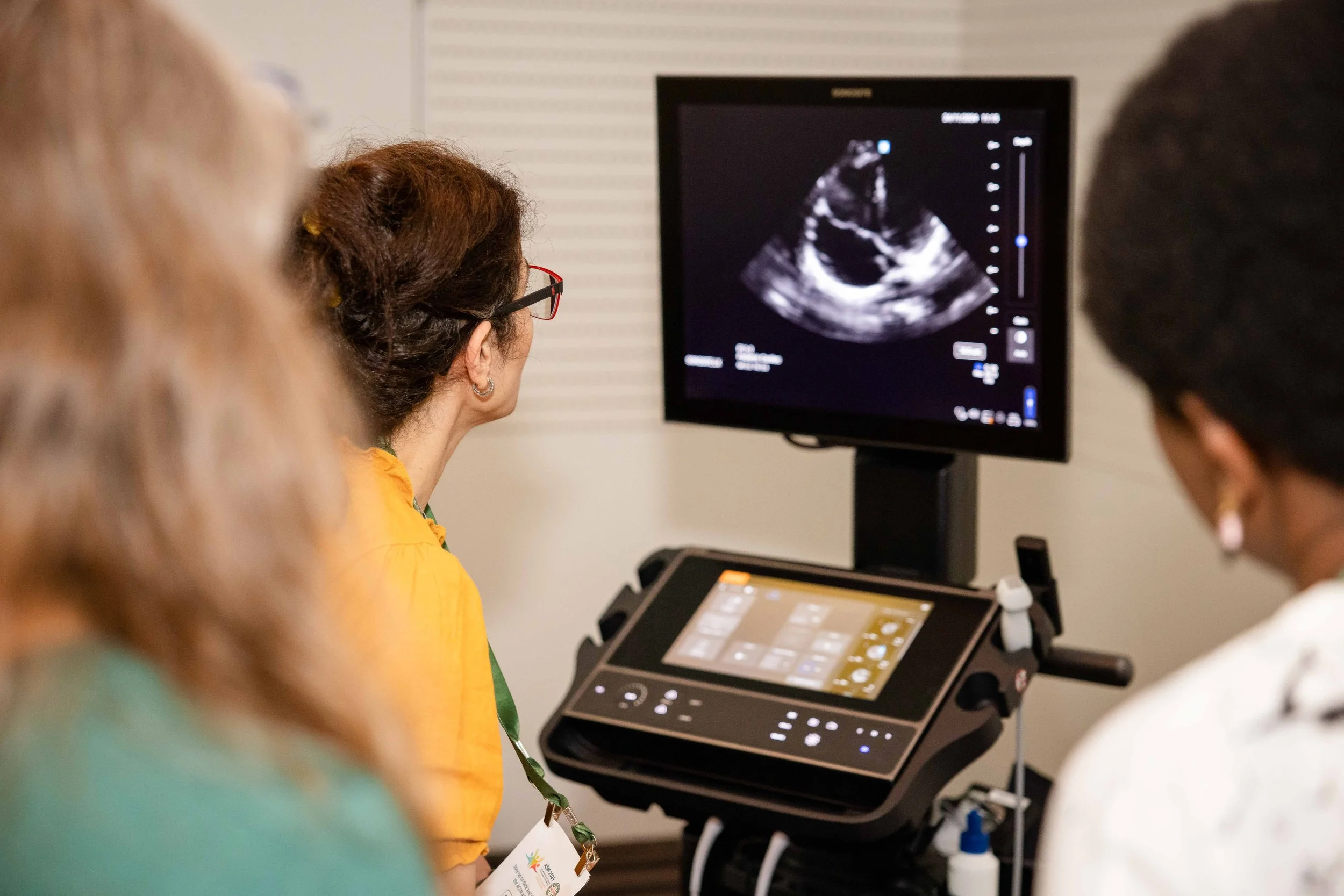Challenge accepted: a better emergency medicine future
For emergency physician Dr Posing Posanau, the invitation to attend the 39th Australasian College for Emergency Medicine (ACEM) Annual Scientific Meeting (ASM) was a ‘wonderful opportunity’.
Dr Posanau travelled from Port Moresby General Hospital in Papua New Guinea to officially accept the 2024 Global Emergency Care (GEC) Scholarship. This award enabled him to come to Australia and strengthen his team’s emergency department practice through access to the ASM’s many workshops and presentations.
‘But one of the best parts of the ASM is the connections you make,’ he said. ‘This is such an incredible networking opportunity to meet people and share knowledge.
‘In the past, in my hospital, we thought we were all by ourselves. But being at an event like this reminds us we are not.’
Dr Posanau joined emergency physicians and their colleagues from across Australia and Aotearoa New Zealand – and his seven fellow GEC scholarship recipients – as they stepped into the future of emergency medicine at the ASM.
The conference was held at the Adelaide Convention Centre from 24-28 November 2024. The event not only offered a packed program of inspirational keynote addresses and professional development learnings, but also precious time to relax and mingle with colleagues in emergency medicine, as well as the chance to share intimate, insightful and friendly ‘fireside chats’ with visiting speakers.
Education and connections
All ASM delegates were invited to embrace the concept underpinning the event – Challenge Accepted: A Better EM Future. But this idea was designed to be more than ‘just a conference theme’. Instead, it intended to be ‘a rallying cry for the emergency medicine vanguard’, where people come together to dissect challenges, forge strategic alliances, and architect a more resilient future.
FACEM Dr Elissa Pearton (Lyell McEwin Hospital, South Australia) shared the role of ACEM ASM 2024 Co-Convenor with FACEM Dr Jorinde Helmich (Lyell McEwin Hospital).
The pair were also part of the ASM organising committee, with FACEM Dr Andy Winfield (Royal Adelaide and Queen Elizabeth Hospital, SA), FACEM Dr Aideen Foley (Royal Adelaide Hospital), FACEM Dr Amanda Casey (Royal Adelaide and Queen Elizabeth Hospital), FACEM Dr Andrew Perry (Royal Adelaide and Queen Elizabeth Hospital), FACEM Dr Rajan Kailainathan (Monash Health, Victoria) and FACEM Dr Wei Shen Lee (Royal Adelaide Hospital and Queen Elizabeth Hospital).
“‘Putting a big event like this together really is a team effort.’”
Dr Pearton said many other ACEM staff also played a significant role in making the ASM possible.
‘Putting a big event like this together really is a team effort.’
She said she was pleased that, even from the earliest hours of the conference, ‘a lot of the people I’ve been talking to are ready to embrace the theme – and accept the challenge. It’s great to see.’
Dr Pearton said those individual challenges would be revealed as the event continued.
‘Day one is a mind-opener. It’s the time they explore the program, plan what they want to see and open their minds to accept a challenge or at least start the search for one that suits them.
‘They’re going to be thrown a lot of challenges throughout the ASM, but they just need to find one that resonates with them for the year ahead. We will have talks that challenge people’s perceptions and preconceived ideas. That is designed to help them see where there is a space for them to accept a challenge – and make a difference to their ED and the way they work within it.’
When asked which of the sessions across the entire ASM was slated to be her favourite, Dr Pearton diplomatically avoided a direct answer.
‘It is like asking who your favourite child is,’ she said. ‘I’m proud of all of them. I’m excited about all our keynotes and our opening talk – it sets the scene for everything that follows.’
Welcome to the traditional Country of the Kaurna people
That scene was set well with the official commencement of ASM 2024.
The heartfelt Welcome to Country was delivered by proud Kaurna and Narungga woman Rosalind Coleman.
A welcome from ACEM President, FACEM Dr Stephen Gourley followed, with the South Australia Minister for Health and Wellbeing, the Hon Chris Picton MP, adding his own personalised welcome. ASM Co-Convenors Dr Pearton and Dr Helmich also addressed the audience.
Monday’s Keynote Speaker was Dr Stuart Swadron, Professor of Emergency Medicine, Keck School of Medicine, University of Southern California. His talk, From classroom to cloud (evolution of teaching), offered unique insights into the ED environment in the United States and shared his projections of how AI will transform EDs across the globe. He also shared some Hollywood-style snippets about interactions with ER actor George Clooney, including the revelation that Dr Swadron celebrated the television and film industry for championing the work done in emergency departments and, mostly, ‘getting it right’.
Global reach
Out in the hall, Associate Professor and FACEM Dr Georgina Phillips came from St Vincent’s Hospital in Melbourne to attend the ASM. She became passionately involved in ACEM’s GEC program after a volunteering stint convinced the then-junior doctor to return to Australia and train with the College.
‘Seeing all the different scientific papers presented is a big thing for the GEC scholars each year,” A/Prof Phillips said.
‘Their big day is Tuesday. They are delivering their oral presentations and then have their special dinner that night, with all the 2024 Scholars and the GEC committee members and all the other people who are very much part of the global emergency care network. It always sells out. It’s my highlight.
‘It’s hard to work in a place where you don’t have all the resources. To come here, have a celebration and celebrate each other with friends and colleagues and new people to meet and network with is such a wonderful way to end the year.’
‘To know that you’re not alone and you’ve got a whole network of peers is so nourishing for them — and for me too.’
Friendship and conversations
In the main hall at morning teatime, attendees were busily seeking nourishment of a different kind. New FACEM Dr Dhanushia Karunanidhy made the trek from Western Australia’s St John of God Midland hospital.
‘Why emergency medicine? The variety and the teamwork,’ she said.
It was her first time at an ASM and Dr Karunanidhy said her key moment had already happened at the Fellowship ceremony on Sunday.
She said her challenge would be ‘figuring out what my next few years as a FACEM will look like’.
“‘One of the really nice things here is that I am running into people I used to work with.’”
FACEM Dr Robert Nayer is one of the emergency consultants at Mt Isa Hospital in Queensland, where he said, ‘we see about 80-120 presentations each day in a 10-bed ED’.
He is also a new Fellow, who started his registrar training in 2019.
Dr Nayer said he was taking advantage of the learning opportunities his first ASM presented and was taking things ‘session by session’ rather than making a firm plan about which talk to attend next.
‘This morning, I went to a session with five previous ACEM Presidents and the conversation was focused on the workforce issues we see in regional, rural and remote settings and how they differ from what you see in the EDs in major cities,” Dr Nayer said.
‘One of the really nice things here is that I am running into people I used to work with.’
As he settles into his new role as a FACEM, Dr Nayer said ‘accepting the challenge for me is about being exposed to a breadth of experience and how best to distil that into some information relevant to my own practice when I go back to my rural ED’.
‘There is already so much interesting knowledge being shared.’
FACEM Dr Michelle Boekelaar agreed. She is an emergency physician at SA’s Flinders Medical Centre and said she was ‘looking forward to the paediatric session’.
‘My challenge? Dealing with overcrowding and finding new ways to deal with that without burning myself and my colleagues out. But I can’t solve that by myself. Being here gives me the opportunity to learn from others,’ Dr Boekelaar said.
Scientific findings and collaboration
In one of the upstairs spaces, FACEM Dr Rob Mitchell had been watching a steady stream of delegates presenting well-researched scientific papers to an attentive audience. Then it was his turn.
Sharing interesting findings and hearing from others who do the same was one of his ASM highlights, he said.
“‘I can reflect on many ASMs where I’ve made genuine connections with someone and then gone on to collaborate with them in some research capacity – and that’s been a real gift.’”
As Chair of ACEM’s Global Emergency Care Committee, he said his take on the ‘challenge accepted’ theme included ‘a chance to reflect on what we’re doing as a College, and to ask ourselves how we can do things better and how we can further professionalise our approach to our work to maximise our impact into the future.’
Each time anyone attended any conference, Dr Mitchell said, ‘It’s good to ask yourself why we have conferences’.
‘You can access high-quality educational content on your computer at home. But the most important value for me is in accessing that content in-person, to have the opportunity to make connections with the people delivering the content – and the people receiving it,’ he said.
‘I can reflect on many ASMs where I’ve made genuine connections with someone and then gone on to collaborate with them in some research capacity – and that’s been a real gift.’
When it comes to his own ideas about what accepting the challenge meant to him, FACEM and former ACEM President Dr Simon Judkins was crystal clear.
He has lost count of precisely how many ASMs he has attended – ‘15, I think?’ – and at this one, he was there as both attendee and presenter, in his capacity as Chair of ACEM’s Sustainable Emergency Medicine and Climate Advocacy Network (sEMCAN).
‘I’ve come here to talk about sustainable emergency medicine and the challenge we want to set is to start our EDs and healthcare systems on the pathway of decarbonisation,’ he said.
As the ASM Convenor back in 2014, Dr Judkins said he had seen many talks and presentations – and that ‘I always have fond memories of the fun we have at ASMs’. ‘The programs are always interesting – and that can make it hard to decide. I’d like to go to five different sessions, but I have to choose one.’
Personal stories had an impact
For some of the presenters, encouraging people to accept a challenge as they faced the new calendar year was about personal growth, as much as it was about professional enrichment.
One of the ASM’s well-received sessions was a collaborative delivery on different topics within the broader theme of equity and inclusion related to the LGBTQIA-ISB community.
Under the banner of, The Decisions You Didn’t Know You Made, session chair Dr Andrew Perry joined ACEM Lead, Equity and Inclusion Dr Barb West, FACEM Dr Bhushan Joshi, FACEM Dr Eve Foreman and FACEM Dr Jean-Yves Kanyamibwa. The session explored different aspects of issues facing diverse communities. Following their individual presentations, designed to encourage and support greater inclusion for both patients and ED staff, the four presenters engaged in a panel discussion, featuring ACEM President FACEM Dr Stephen Gourley.
In one of his first statements as President, Dr Gourley said: ‘When I became a doctor, I saw no openly gay doctors in senior roles. Through this, I learned what it was to be a minority and what goes with not being completely mainstream. Diversity is important to me.’
On the panel, Dr Gourley looked at the issue of greater inclusion through a governance lens and said, ‘this is a really important bit of work and something we’re absolutely committed to’.
‘And I’ve got a bit of a personal stake in this as well, so I really want to see this transform,’ he told the audience.
‘I think it’s worth pausing for a second and reflecting on how far we’ve come already, as well.’
He said that, when a group of senior ACEM members gathered to look at a photograph of the ACEM board circa 2011, ‘it was all middle-aged white men – everyone’.
‘That was a huge wake-up call and there’s been a lot of work that’s been undertaken to try and address that.
‘We’ve made the first steps. It doesn’t mean we’re there but it’s encouraging to see a bit of progress.
‘We’ve got a long way to go yet, but at least we’ve started.’
Strengthening regional, rural and remote EDs
At the Rural & Remote Emergency Medicine session, the official release of ACEM’s State of Emergency 2024: Regional, Rural and Remote report was welcomed. A panel discussion, How rural emergency medicine went from zero to hero, was moderated by Dr Pearton and invited participants FACEM Dr Lauren Kennedy, FACEM Dr Juan Carlos Ascencio-Lane, FACEM Dr Karly Field, Dr Stephen Gourley and FACEM Dr Renee Pearman to share their own stories explaining their commitment and enthusiasm for RRR medicine.
For Dr Kennedy, who trained in metropolitan EDs then regional Mt Gambier, then moved back there fulltime, part of the attraction was also lifestyle – and the chance to balance her professional life as an emergency physician with looking after alpacas on her property.
Would she make the switch back to the city again?
‘I'm far too many alpacas deep now,’ she said.
Something for everyone
As the ASM continued, there was something for everyone, from the practical (ultrasound in the ED, focused echocardiography in life support and geriatric emergency medicine) to social (a Queer Networking event and the ED Musos singalong session).
The keynote speakers across the program included emergency physicians and FACEM Dr Max Raos, FACEM Dr Glenn Harrison, FACEM Dr Kimberly Humphrey and Neurotech Institute CEO Fiona Kerr. They collectively covered everything from First Nations care to working with AI and building resilient and sustainable EDs. Other speakers, including Chair of the National Aboriginal Community Controlled Health Organisation, Donnella Mills, the Royal Flying Doctor Service’s Dr Mardi Steere and FACEM Dr Tecwyn Davies from Médecins Sans Frontières, all shared their own unique perspectives.
And because all work and no play makes for dull ED physicians, the ASM Gala Dinner was a firm crowd favourite, with fine food…and much dancing! There were also boat rides, tours to one of South Australia’s renowned wine regions, the chance to overcome vertigo via the Adelaide Oval stadium roof climb, as well as a range of other wellbeing activities aimed at invigorating both mind and body.
As the multi-day event came to an end, Co-Convenor Dr Helmich shared a tally of some of the activities and educational sessions that were delivered during the ASM, including the two pre-conference days: 255 oral presentations, 14 workshops, 46 sessions and 11 social functions.
“‘We walk the walk every day and we talk the talk every day but this conference, I think, was about sharing a dream,’”
‘We walk the walk every day and we talk the talk every day but this conference, I think, was about sharing a dream,’ Dr Gourley said in his closing address.
That shared dream, he said, was for a better and brighter emergency medicine future.
‘And we’ve definitely accomplished that, so thanks very much.’
Riding the wave of change
As he introduced a video teaser of some enticingly picturesque Gold Coast scenery, he announced the theme and location of the 2025 ACEM ASM and added that returning to the place he went to high school and undertook his initial medical training would feel ‘like going home’.
“We let our hair down, talk, exchange ideas and make new friends. To me, that’s the most important part of any event.’”
It was a feeling he said was ‘fitting’, given that 2025 will be his final year as ACEM President.
‘I’m looking forward to riding that wave of change,’ Dr Gourley said, in reference to next year’s ASM theme.
Dr Gourley extended a warm welcome to the ACEM President-Elect, FACEM Dr Peter Allely, as well as thanking former President FACEM Dr Clare Skinner.
‘Thank you again to the 2024 Organising Committee for all your hard work in putting this fabulous event together,’ he said, before adding a thank you for the ACEM events team.
‘You knocked it out of the park.’
After expressing his gratitude for the speakers, sponsors and everyone involved in the event, Dr Gourley thanked the attendees.
‘That’s what makes this fellowship a true fellowship. We all come together and celebrate what we do. We let our hair down, talk, exchange ideas and make new friends.
‘To me, that’s the most important part of any event.’




















